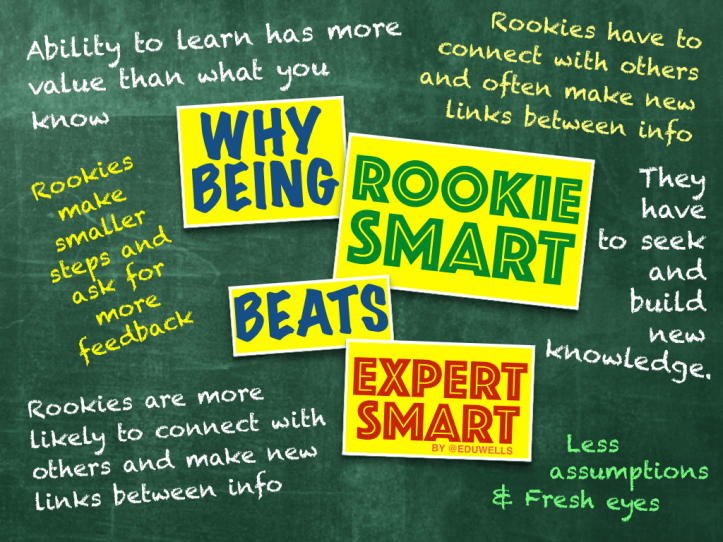 As a teacher, I found Curious Minds episode 41 with Liz Wiseman on Why Learning Beats Knowing, sparked a number of ideas that connected with my recent posts emphasising the need for self-learning practice in schools over that of receiving teaching. Liz explains with numerous examples, why a ‘rookie’ approaches problems and projects from possibly a better starting point than an expert might. I thought I’d offer you my takeaways from this podcast (although I highly recommend listening to the whole thing). Liz’s book is available here.
As a teacher, I found Curious Minds episode 41 with Liz Wiseman on Why Learning Beats Knowing, sparked a number of ideas that connected with my recent posts emphasising the need for self-learning practice in schools over that of receiving teaching. Liz explains with numerous examples, why a ‘rookie’ approaches problems and projects from possibly a better starting point than an expert might. I thought I’d offer you my takeaways from this podcast (although I highly recommend listening to the whole thing). Liz’s book is available here.
Be Rookie smart not Expert smart
The most important role a teacher has theses days is to model learning and encourage curiosity. If we continue to base classroom practice around our expert status, we present ourselves as the endpoint of any expectation or debate. Teachers develop better learners when they model trial & error. Nurturing a classroom culture where everyone, including the teacher, is in a constant state of personal development means expectations and possibilities are left open-ended rather than fixed to the teacher’s ‘correct answers’.

Hide your inner expert to inspire your rookies
 Rookies make for better learners than experts.
Rookies make for better learners than experts.- Ability to learn has more value than what you know in the 21st Century.
- Rookies aren’t weighed down with prior assumptions and have a larger need to seek and build new knowledge. This leads to new ideas and approaches to problems.
- A rookie has to make smaller but more regular development steps, constantly needing feedback and assurance. ‘Expert’ teachers often make giant leaps towards known answers. The rookie’s baby steps require a rapid feedback loop, which leads to a more agile learning process more suited to the 21st Century economy/society.
- Acting as if no expert exists in the room, rookies need to connect with others, which encourages collaboration and participation.
- Lacking knowledge resources leads to more adaptive and resourceful approaches to problem solving and knowledge acquisition.
It’s time for teachers to ask their students:
- What makes a successful rookie?
- What do we need and where might we get it?
- Who can help us? etc.
It’s best teachers present the idea that no correct answers exist in the room and even if they secretly do, it’s the challenge for teachers to guide in such a way that students might arrive at their own answers but hopefully in new and inspiring ways that the teacher can learn from. This completes a rather neat circle of learning.
Here’s a great video (via @geomouldey, via @Dwenmoth) that outlines many of the reasons why we need rookie rather than expert approach to classroom practice.
 Want more ideas and initiatives like this one? My book A Learner’s Paradise by Richard Wells is full of them. Available now on Amazon.com
Want more ideas and initiatives like this one? My book A Learner’s Paradise by Richard Wells is full of them. Available now on Amazon.com
